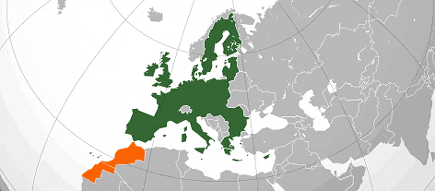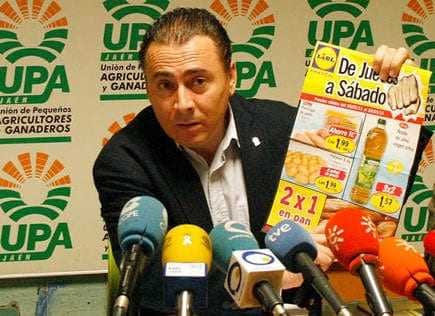
Moroccan olive oil producers say Spain should not be so scared of a wider EU-Morocco free trade deal — at least for now — because the United States market is their main target.
Spain’s olive oil sector is in furor over the plan, which would eliminate an EU customs duty (currently about €1.25 per kilo) on Moroccan olive oil and restrict to 2000 tons the amount of EU oil allowed to enter Morocco tariff-free.
The European Parliament ratified the proposal earlier this month by 369 votes to 225, with most of its Spanish members voting no. There is now talk of a Spanish appeal to Europe’s Court of Justice.
Under the heading, “Andalusian oil at the crossroads,” national newspaper El País reports that the Andalusian Federation of Agricultural Cooperative Enterprises (FAECA) described the agreement as a “disaster” for the Spanish olive oil sector. Another agricultural organization, the UPA, said it would cause the loss of thousands of jobs and farms.

Agustín Rodríguez, UPA general secretary, at a press conference last month.
“It will be Moroccan imports that determine the competitiveness, prices and future of farmers in Andalusia because we won’t be able to compete with the slave wages in Morocco and…breaches of plant protection and food safety regulations,” claimed Agustín Rodríguez, UPA general secretary for Andalusia.
But from Casablanca, Othmane Aqallal, managing director of Atlas Olive Oils, told Olive Oil Times that the US, not Europe, was the main export destination of Morocco’s bulk olive oil.
“The free trade agreement will not hurt European producers much in the short term. Moroccan exports to Europe have been low these last four years. We did not export more than 4000 tons per year to Europe. Morocco’s real export market for olive oil is the US, where last year it exported around 30,000 tons. However, in the long run, Europeans may suffer, relatively, if Morocco continues to expand its olive plantation surface like it did in the last five years,” Aqallal said.
As for bottled olive oil, the agreement would have very little impact because Morocco exports less than 5 percent of its olive oil in this format, Aqallal said. “Also, Morocco’s main exports of bottled olive oil are intended for the ethnic Arab market. So with or without this free trade agreement, the ethnic market is the traditional buyer of Moroccan olive oil.”
Moroccan production soaring
According to International Olive Council (IOC) forecasts, Morocco was set to double its olive oil production to 150,000 tons in 2010-11 while world-leader Spain was expected to weigh in with 1.37 million tons.
Morocco plans to achieve olive oil production of 340,000 tons by 2020. It is among the world’s biggest exporters of table olives and ranks about sixth or seventh for olive oil, with Italy one of its main buyers. In recent years some Spanish supermarket chains have faced criticism for sourcing some of their store brand olive oil — often used as a loss leader — from Morocco.
United States
Last year the San Francisco Chronicle reported the concerns of Californian olive growers over US agricultural aid to Morocco. Local growers told the paper that California had been “battling Morocco and Spain for the black table olive and olive oil markets in this country for more than a decade.”
Morocco already has a free-trade agreement with the US.








